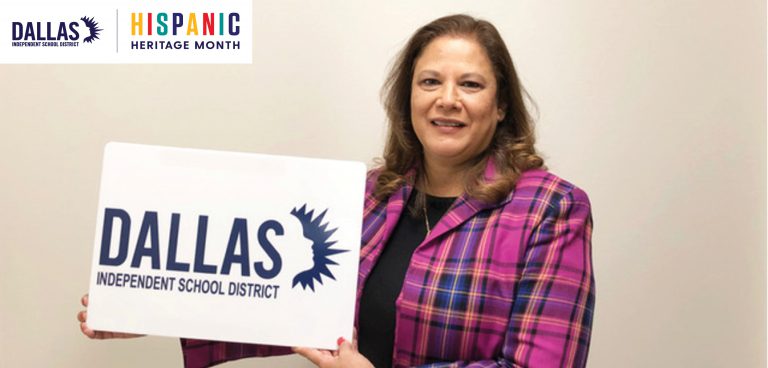Liliana Valadez, current executive director of Parent Advocacy and Support Services at Dallas ISD, has strong ties to both Texas and the district. She proudly explains that her family did not migrate from any Hispanic country, but they were on the Texas side of the Rio Grande when Texas was born as a republic. Both her parents and grandmother were longtime educators–her father was the district’s first Hispanic high school principal back in the ‘70s, and her mother was one of Dallas ISD’s original bilingual curriculum writers. Valadez herself is a product of the district, having graduated from Bryan Adams High School and eventually returning to serve in various positions at the teaching and leadership level.
“My loyalty to Dallas ISD is strong because I feel that moving to Dallas when we did, gave me and my family many opportunities that we would not have had otherwise,” said Valadez. “I think our lives would have been different.”
As the executive director of the department Parent Advocacy and Support Services, she works hard with her team to ensure that every family arriving in the district feels welcome and engaged, and has a space to ask questions and solve problems.
“We want parents to have a voice and we have to listen,” said Valadez. “They call us to see if we can help them solve issues that they’re having. That involves constant communication with the principals to see how we can help and support.”
Valadez adds that there is another side to the job her department does, leading the family and community engagement.
“We are now in what’s called the whole school model, efforts where we really help campuses connect with parents,” she said. “We’re making virtual visits to help build relationships with our families. We ask them about their hopes and dreams for their kid, and as teachers we can use that to engage students and get them interested.”
This service is particularly important in the context of Dallas ISD’s demographics, featuring a large percentage of Hispanic students, many of them recent immigrants to the United States.
“We have had to adjust what we do over the years because of the changing demographics. Even within the Hispanic community there are differences,” said Valadez. “Each of them has different needs and things they bring to the table.”
“These are people who have come to this country and this community mostly to seek a better life for themselves and their families, but in many cases they don’t have access to the resources available to them,” she said. “They need the support from the district and from our schools to find out how the system works, and hopefully we help them with that.”
Valadez recognizes that the support of Hispanic parents–and parents in general–is critical for the academic growth of students. In general, she said the district is on the same page with parents, giving students a clear sense of expectations, benefiting them in the long term.
“As a message for our families in this Hispanic Heritage month, I would like to say to them: Welcome. We are here to support you and we really want to hear from you what we can do to enhance your education experience here in the district,” she said.

